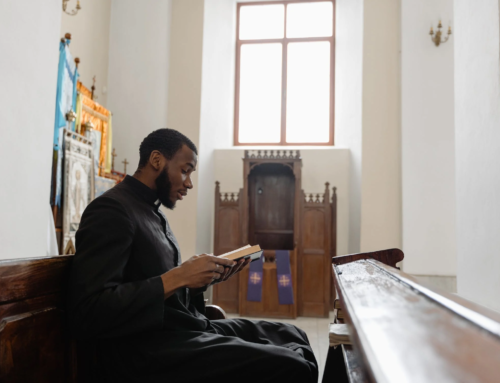In this article, Sr. Susan Louise Eder, OSFS explores the unlikely backstories that gave rise to two unique representations of Salesian spirituality. St. Jane Frances Frémyot de Chantal and St. Léonie Aviat, she argues, both represent in their personal stories the gentle strength at the center of the charism passed down from St. Francis de Sales.
Click here to download a copy of the essay.
St. Jane Frances Frémyot de Chantal has influenced many people throughout the ages through her deep spirituality, strength of character, and determination in the face of many obstacles. St. Léonie Aviat, who is less familiar to most people, is a sign our world needs to see—the quiet, gentle strength which is so Salesian in nature.
I want to focus on Jane as a person and on her contribution to what we know as Salesian spirituality. I propose to discuss first her relationships in her family, then her partnership with St. Francis de Sales, and finally her ‘birth’ to the role of torchbearer of this unique spiritual charism during the last 19 years of her life. I would then like to discuss Léonie, her similarities and differences to Jane and her role in giving life to the Salesian heritage in a very different world.
Jane and Her Family
Jane was born at a time when the medieval order was passing away and Europe, for better or for worse, was moving into the modern age. It was a violent time, one marked by intolerance and fanaticism, bearing some similarities to our world today. Jane’s childhood was a wonderful one, but it was not peaceful and idyllic.
I recently read something that referred to Jane as an ordinary woman who accomplished great things. I have to disagree; I see nothing ordinary in Jane. I think she was an extraordinary person, exceptionally intelligent and possessing unusual gifts of leadership and organization. She was destined to be a foundress and an innovator, and she embraced this destiny which she never would have chosen for herself.
Before taking on the role of foundress where we know her best, Jane Frances Frémyot de Chantal was a daughter, sister, wife and mother.
We know that the Frémyots, Jane’s natal family were loving, devoutly Catholic, privileged, and influential. Jane lost her mother when she was a very young child, only 18 months old. She loved her father deeply and felt loved by him. This loving confidence was surely the source of her strength of character that readied her to take on the many other roles that she would have. He provided her with an education that few young women of her time enjoyed.
Jane and her sister Marguerite were close but her sister married and left their household when Jane was still young. Jane would visit her, before she herself married. In line with the times in which they lived, even Marguerite’s husband felt that he could direct Jane’s life. He pressured her to accept a gentleman he proposed to her. Jane’s refusal led to some conflict between herself and her sister’s family but this improved over time, especially after Jane married Baron Christophe Rabutin de Chantal. As wives and mothers, each would have been almost entirely taken up with her own family. It was to be expected and took nothing away from the love they shared as sisters.
Jane and her brother André, Archbishop of Bourges, were also devoted to one another. We can trace Jane’s personal evolution in this relationship in particular. Given the social mores of her time, Jane had no authority or right to possess property or make decisions in her own name. We can only imagine how difficult this must have been for a woman of her intelligence and strong character. Upon the death of her husband, M. Bénigne Frémyot, her father, and André , her brother, had every right to make her decisions and direct her life. We see this with great clarity in the years before she founded the Visitation. Without their support and permission, she could not have followed her religious vocation. As the years went on, however, André recognized the superiority of his sister, both intellectually and spiritually, and turned to her for advice. This was extraordinary in their day and was a total reversal of societal norms.
Jane loved her husband Christophe deeply and was a very happily married woman. Although we do not hear her saying this, she was also deeply hurt by him. Christophe was not faithful. Anyone who loved as passionately as Jane did had to have suffered from this. She rose above that and committed herself all the more to her role as his wife, even caring for his daughter Claudine. She was devastated by his accidental death and it was very hard for her to forgive his cousin who caused it. As Christophe’s wife, she also had responsibilities to his extended family. We know that her father-in-law, Claude du Rabutin, was a difficult and, in many ways, uncultured man. This has led to Jane being the patron of people with difficult in-laws—what a singular distinction!
Her father-in-law was the father of her beloved husband Christophe and the grandfather of her children. That was enough for Jane. She willingly suffered through the time she spent in his household and lovingly cared for his subsequent children and suffered at the hands of his mistress. Jane rose above this mistreatment and did not even share it with the one person who could have helped her, her own father, M. Fremyot. Jane knew her duty and embraced it. Someone of a weaker character could not have done this so well.
Jane’s role as mother was as diverse as her four children. Perhaps it was only with her eldest daughter Marie-Aimée that her motherhood was at all what she would have expected. She initiated and successfully concluded the arrangement with the de Sales family for Marie-Aimée and Bernard de Sales to marry. Besides her tremendous respect for Francis, part of Jane’s motivation in arranging this marriage was restitution for the death of his younger sister, Jeanne, who had been in her care at the time of her illness and death. Although their marriage was arranged, as Jane’s had been, Marie-Aimée was very happy. Sadly, Marie-Aimée herself was widowed at a very young age and then died shortly after this in childbirth. This was very painful for Jane but she strove to see God working in the midst of this.
Jane had previously experienced the death of her younger daughter, Charlotte. Losing 2 of her children so young was devastating to Jane. She carried the burden of these losses throughout life. It did not make her bitter, but rather more loving. This is one of many indicators of Jane’s incredible inner maturity and deep spirituality. We know that Jane loved passionately. She could only accept these losses of her beloved children because of her deep interior life.
Jane’s two remaining children were both interesting characters. Her only son, Celse-Benigne, was l’enfant terrible or, in the vernacular, a brat. He was willful and a terrible risk taker. He was not docile to his mother’s wise and loving direction. It was only through the intercession of her influential family that he managed to survive young adulthood as he had been sentenced to death for participating in a duel which was expressly forbidden in France at that time.
To his credit, Celse-Benigne later recognized what an extraordinary mother he was privileged to have. I am sure she was very forgiving because, after all, he provided her with her only grandchild, who went on to become the well-known writer,
Marie de Rabutin-Chantal, marquise de Sévigné whose letters to her daughter are considered cherished French literature of the 17th century.
Jane’s youngest, Françoise, grew up in the convent, a practice that seems strange to us but one which was common enough at the time. Françoise let it be known, at a young age, that this was not the life for her. She loved pretty clothes, jewelry, and festive parties. Jane respected her daughter’s choice although she worked to temper her worldliness. As a devoted mother of her day, she helped Françoise to enter into a good marriage. Françoise did not make it easy on Jane who was, simultaneously, managing the rapidly growing Visitation order. Françoise was the only one who survived Jane. They loved one another dearly and corresponded frequently.
Jane’s family was extremely important to her – both her natal family and her married family. She carried this love in her heart throughout her life.
Jane’s partnership with Francis
Jane Frémyot de Chantal loved her family passionately. Becoming the mother to the Visitation Order did nothing to diminish this love. Her union of hearts with her spiritual father, Francis de Sales, and her daughters of the Visitation were a natural progression from this ardent familial love.
Jane and Francis met when Francis de Sales preached a Lenten series of sermons in her hometown of Dijon . Each of them saw the working of the Holy Spirit in these encounters. They came to discern that they were being called to do something new together. In addition to seeing the grace of God in each other, they recognized the exceptional character and gifts that each possessed. Let us not forget that when they met in 1604, neither was a saint as yet. They would have seen each other in very human, personal ways.
Jane finally found in Francis the spiritual director she had been seeking. Her loving passionate heart could finally abandon herself and place her trust in him, in ways she had not been able to do previously. What did Francis find in Jane in these early years of their relationship? We don’t really know, other than some brief excerpts from letters, but based on all we know about Jane and Francis, both before and after their first encounters, we can surmise several things.
Francis likely recognized that this was an exceptional woman. Not only was she intelligent and well-educated, but she possessed an unusual degree of prudence and right judgment. This was a woman who could take on great responsibility and creatively solve difficult problems. Francis knew, given his responsibilities, both spiritual and political, that he would not be there for the day-to-day decisions that would need to be made in founding a new religious community. Jane would need to take Francis’s ideals and craft their practical application without consulting him, except through letters and meetings because of their physical separation.
Francis likely would have seen Jane’s great capacity to love. Her maternal heart was ready to expand and to welcome many more daughters. Jane could balance these two characteristics of loving heart and prudent judgment to steer this new community in the right direction. What a gift to the Church!
In all of this, Jane was docile to Francis’s direction. Although she was a woman of exceptional capacity, she saw Francis as the spiritual impetus for this new life, which she embraced. She had been longing to consecrate herself to God and put her gifts to use to help bring this new way of religious consecration to life.
Although Jane looked to Francis for spiritual direction, he also saw in her a deep spirituality which helped to create the Visitation Order and to inform the Treatise on the Love of God. In his earlier work with several women under his spiritual direction, Francis had crafted the Introduction to the Devout Life. In his spiritual interchanges with Jane and her Sisters, he found ample material for the Treatise.
Although I summarized their relationship as “Jane’s Partnership with Francis,” I think she would have disagreed with me, not seeing it that way at all. She venerated Francis as her spiritual guide and recognized that he had a unique spiritual gift for our world. That is certainly true and it is why we are celebrating this Jubilee. But from our historical perspective, we have the luxury of seeing Jane’s contribution to the evolution of this spirituality and how she brought it to life.
What Francis taught and preached, Jane lived. What he imagined, she built. What he dreamt, she fashioned. Within their unity of hearts which is explored and presented so well by Dr. Wendy Wright[1], a new sort of spirituality came to light. A partnership, a two-sided male and female philosophy, ushered in a modern view of the spiritual life. Francis de Sales taught us the universal call to holiness. Jane de Chantal lived it and gave it flesh. The medieval model was passing away and a new spiritual archetype had arrived.
All of this prepared Mother de Chantal to be the torchbearer of Salesian spirituality upon Francis’s death in 1622.
Birth to the Role of Torchbearer
It is no coincidence that we are celebrating a double jubilee, the death of Francis and the birth of Jane. Until Francis’s death, Jane saw him as the leader and the spiritual source of the Visitation. He was the founder, the spiritual father. She would have defined her role as secondary, one of carrying out his designs. This was generally accepted and was natural. Jane had been in this position throughout her life—with her father, her brother and her husband.
With Francis’s death, Jane was born to something new. It was up to her to continue expanding the Visitation and solidifying the place of Salesian spirituality in our world. We know that she did this in an amazing way. It is hard to imagine how she managed to found so many monasteries, especially considering how difficult travel was and how complicated the Church and society were. Like Francis, she wrote and received many letters. She had to be available to her Visitandine daughters and to all those who came to her for advice.
If this was all she did, we would still be amazed, but it was not. Jane worked very hard to move Francis’s cause for canonization forward with lengthy depositions which required extensive preparation. She assisted Francis’s successors very ably and provided sound advice to churchmen and laypersons alike. Jane continued to guide the Visitation in fidelity to its founding mission. This was essential as the number of monasteries increased so rapidly.
During these years, Jane continued to be a loving mother and sister to her own family and to Francis’s. His brothers recognized her spiritual and practical wisdom and called on her for advice.
Jane wrote extensive letters to her Visitation Sisters, providing leadership advice and spiritual counsel.
And what was the torch that Jane carried forth to ensure that the teaching of her beloved Father would be kept alive? I would like to allow Jane to speak to us here:
“Keep your eyes on God and leave the doing to him. That is all the doing you have to worry about, and the only activity which God asks of you and towards which it is he alone who is drawing you.”
“I may add that it is this that our blessed Father would always order me to practice, holding the mind in all simplicity and directness, without act or effort, in that simple gaze upon God and contemplation of God, in total surrender to his will; without a wish to see, or feel, or carry out any work, but merely content to remain in his presence – relaxed, at peace, confident, patient, never inspecting self to see how things are going nor what one is doing, feeling, or enduring. No, you must not inquire what your soul is doing, has done, or will do, nor what may happen to it in any future event or contingency. From this position you must not budge because this sole and single gaze upon God embraces all our duty, especially in a state of suffering… One thing alone is necessary; it is to have God. In short, then, no matter what is going on, we must hold both our attention and our love on God, not wasting our time in studying what is happening to ourselves, nor what is our cause. Our Lord asks this of us.” [2]
Jane had lived the teachings of Francis so well and so long that they flowed naturally from her. To look upon ourselves is the greatest mistake possible in the spiritual life. God alone is the focus of our entire being.
Since Salesian spirituality also guides our relations with one another, she would tell her Sisters to deal with one another with a care that is genuine, loving and gentle. Jane saw a unity in our approach to God and those around us. If God is our center, all falls in place.
Jane de Chantal was the embodiment of all Francis had lived and taught. As we celebrate the 450th anniversary of her birth, let us draw from her strength, her wisdom, her motherliness, and her innate goodness.
Saint Léonie Aviat – so different and so alike
The 4th and last topic I would like to present is a short discussion of St. Léonie Aviat, her role in the Salesian family, and her similarities and differences with St. Jane.
For so many of us, our first encounter with Salesian spirituality was the Visitation Order. It was through Mother Marie de Sales Chappuis that Léonie Aviat encountered Francis and Jane. Léonie is another fascinating woman with so much to offer our modern society.
Léonie lived in a completely different world from Jane and Francis. It was post-Revolutionary France and French society was largely secular. The Industrial Revolution had taken root and was a major factor in the foundation of the Oblates of St. Francis de Sales. Workers from the countryside flocked to cities like Troyes where the Oblates of St. Francis de Sales would minister to their physical and spiritual needs. It was no longer the genteel world that Jane and Francis had known, with the church playing a major role in matters of state and in personal decisions.
Jane and Francis lived in a world with distinct layers of society. Roles were defined, for better or for worse. The founders of the Oblates of St. Francis de Sales did not know this world. The Revolution had changed all of that. Léonie was the daughter of merchants, Theodore and Emilie Aviat. She was born in 1844 in Sezanne, a small town not too far from Troyes where the Oblates were founded. She attended the Visitation school in Troyes because her uncle had saved the monastery during the French Revolution. Her family did not practice their faith with any regularity or fervor. When she expressed a desire to be a religious, her father was completely opposed, so much so that Léonie waited until she was 21, entered the community which she was founding without telling her family, and never saw her father again as he refused to see her. She did have the great joy of having her mother join the community after her father’s death.
In contrast to Jane, who enjoyed a beautiful, strong relationship with her father and her family, Léonie had to leave those relationships behind to pursue her vocation as foundress and to fulfill God’s will for her life. That had to be difficult for the kind and loving young woman that we know Léonie to have been.
Both Jane and Léonie were called to found new communities. Both followed the lead of a spiritual father to whom they deferred as long as he was alive. We have seen this in Jane’s life. Léonie did this as well. Everything she taught and wrote was based on the teachings of Fr. Louis Brisson. He was the founder and she deferred to him, that is, until the Congregation was expelled from France and the Motherhouse relocated to Perugia, Italy in 1904. Léonie then became the torchbearer of this unique Oblate charism which was rooted in Salesian spirituality. She had to guide her daughters through a painful time when they lost their houses and their works, and so many Sisters had to leave behind families they knew they would never again see. Only a strong, gentle soul who had pledged, “to forget myself entirely” could do this.
Of course, like Jane and Francis, she was not born a saint. She had to struggle as each of us does. She admitted in her personal notes that she was dismayed when she learned who Fr. Brisson had chosen to be her first companion in founding the Oblate community. In her own words, her very real and human reaction was, “Anyone but her.” And Léonie was not wrong. This Sister caused great suffering to Léonie and the community in subsequent years. But this is where we see the saint emerging. Léonie treated her first companion with tender love and compassion. When Leonie was once again named Superior General, she took great care of this Sister and never allowed others to criticize her. If we want to study the little virtues of St. Francis de Sales, we could find no better model than St. Léonie Aviat.
I also think that Léonie was the embodiment of the beatitude, “blessed are the pure in heart for they shall see God” (Mt 5:8). There is a story told by the Sisters who worked closely with her. There was an incident when someone publicly humiliated and embarrassed one of the Sisters. When the Sister joined Léonie Aviat in her office, she expressed her indignation and anger toward this cruel treatment. Léonie looked at this Sister with sadness and replied in her characteristic and gentle manner, “What? You still haven’t understood.” [3]Her heart was pure—turned toward Christ and, like him, she held no malice toward others. This pure spirit saw God in each person and in each circumstance.
During this Jubilee year, there is a maxim of St. Francis de Sales that should be our byword. It describes these two holy women so well that it is the thought that I would like to leave with you: “Nothing is so strong as gentleness and nothing is so gentle as real strength.” Like Jane, like Léonie, may we find our strength in a gentle, loving heart.
[1] Wendy Wright, Bond of Perfection: Jeanne De Chantal and Francois De Sales (New York: Paulist Press, 1986).
[2] A. Durand, St. Chantal on Prayer (Boston: Daughters of St. Paul, 1968), 44–5.
[3] Marie-Aimee D’Esmauges, Léonie Aviat, Mother Frances de Sales, 127.






